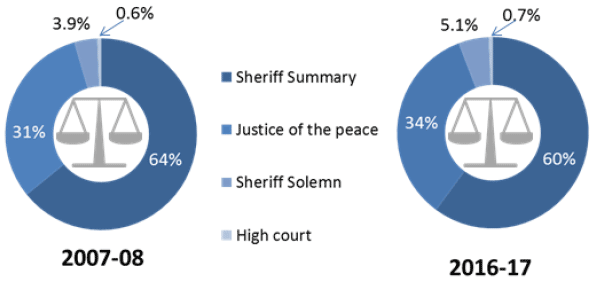Criminal proceedings in Scotland 2016-17: statistics
Statistics on criminal proceedings concluded in Scottish courts and alternatives to prosecution, issued by the police and by the Crown Office.
This document is part of a collection
4. People convicted by court type
( Table 3)
There are three main court types that deal with criminal cases in Scotland:
- The high court, which deals with the most serious crimes such as murder, rape and armed robbery. A single judge hears cases with a jury of 15 people.
- Sheriff Courts, which deal with the majority of cases in Scotland. These can either be solemn, where the Sheriff sits with a jury of 15 people or summary, where the Sheriff sits alone. The maximum penalty that may be imposed for summary cases (in most circumstances [1] ) is 1 year's imprisonment or a £10,000 fine. For solemn cases the maximum penalty is 5 years' imprisonment or an unlimited fine.
- Justice of the Peace courts deal with the less serious crimes, such as speeding, careless driving and breach of the peace. They are chaired by a justice of the peace or "lay magistrate" who has been appointed from the local community and trained in criminal law and procedure.
Chart 4 shows that 60% of convictions in 2016-17 were in sheriff summary courts, four percentage points less than ten years ago when levels were at 64% in 2007-08. The fall reflects the growing share of activity in Justice of the Peace ( JP) courts, which accounted for 34% of convictions in 2016-17 compared to 31% in 2007-08. This is consistent with the aims of Summary Justice Reform which was introduced in 2007, which included enhancing the capacity of Justices of the Peace to act as judges and making effective use of non-court disposals. See Annex E for more detail.
Chart 4: Proportion of convictions by court type, 2007-08 to 2016-17

A total of 92,334 people were convicted in 2016-17, a fall of eight per cent on levels in 2015-16 (99,962). There was also an eight per cent fall in the numbers of proceedings. The annual change varied by court type with:
- Activity in Justice of the Peace ( JP) courts is a large component of the overall decline with a 10% fall from 35,149 convictions in 2015-16 to 31,484 in 2016-17. The decline follows relatively high levels in 2013-14 and 2014-15 of over 41,000 convictions in each year, which can be attributed, in part, to a rise in motor vehicle offence business, which are types of offences JP courts tend to deal with. However, motoring offences have fallen sharply this year, taking JP court activity to its lowest level in the last decade. Motor vehicle convictions dropped by six per cent to 30,596 convictions in the last year.
- Convictions in Sheriff Summary courts were also notably down, falling by six per cent to 55,489 in 2016-17 from 59,224 in 2015-16. The fall follows a period of relative stability in Sheriff Summary court convictions over the previous four years.
- The number of convictions in Sheriff solemn courts decreased by five per cent in 2016-17 to 4,719 convictions from 4,986 in 2015-16. This reduction reverses the increases seen in 2014-15 and 2015-16, although this total remains 13% higher than in 2013-14.
- The number of high court convictions increased by six per cent in 2016-17 to 642 convictions (from 603 in 2015-16), although high court activity remains historically low. Please note that recording delays are typical for high court activity due to the complex nature of cases held there. As a result the total number of high court convictions for more recent years may be slightly underestimated.
Contact
There is a problem
Thanks for your feedback